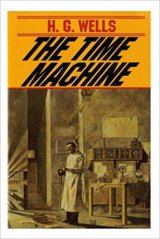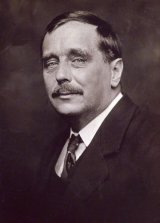The Time Machine Page #10
The Time Machine is a science fiction novella by H. G. Wells, published in 1895 and written as a frame narrative. The work is generally credited with the popularization of the concept of time travel by using a vehicle or device to travel purposely and selectively forward or backward through time.
“At once, like a lash across the face, came the possibility of losing my own age, of being left helpless in this strange new world. The bare thought of it was an actual physical sensation. I could feel it grip me at the throat and stop my breathing. In another moment I was in a passion of fear and running with great leaping strides down the slope. Once I fell headlong and cut my face; I lost no time in stanching the blood, but jumped up and ran on, with a warm trickle down my cheek and chin. All the time I ran I was saying to myself: ‘They have moved it a little, pushed it under the bushes out of the way.’ Nevertheless, I ran with all my might. All the time, with the certainty that sometimes comes with excessive dread, I knew that such assurance was folly, knew instinctively that the machine was removed out of my reach. My breath came with pain. I suppose I covered the whole distance from the hill crest to the little lawn, two miles perhaps, in ten minutes. And I am not a young man. I cursed aloud, as I ran, at my confident folly in leaving the machine, wasting good breath thereby. I cried aloud, and none answered. Not a creature seemed to be stirring in that moonlit world. “When I reached the lawn my worst fears were realised. Not a trace of the thing was to be seen. I felt faint and cold when I faced the empty space among the black tangle of bushes. I ran round it furiously, as if the thing might be hidden in a corner, and then stopped abruptly, with my hands clutching my hair. Above me towered the sphinx, upon the bronze pedestal, white, shining, leprous, in the light of the rising moon. It seemed to smile in mockery of my dismay. “I might have consoled myself by imagining the little people had put the mechanism in some shelter for me, had I not felt assured of their physical and intellectual inadequacy. That is what dismayed me: the sense of some hitherto unsuspected power, through whose intervention my invention had vanished. Yet, for one thing I felt assured: unless some other age had produced its exact duplicate, the machine could not have moved in time. The attachment of the levers—I will show you the method later—prevented anyone from tampering with it in that way when they were removed. It had moved, and was hid, only in space. But then, where could it be? “I think I must have had a kind of frenzy. I remember running violently in and out among the moonlit bushes all round the sphinx, and startling some white animal that, in the dim light, I took for a small deer. I remember, too, late that night, beating the bushes with my clenched fist until my knuckles were gashed and bleeding from the broken twigs. Then, sobbing and raving in my anguish of mind, I went down to the great building of stone. The big hall was dark, silent, and deserted. I slipped on the uneven floor, and fell over one of the malachite tables, almost breaking my shin. I lit a match and went on past the dusty curtains, of which I have told you. “There I found a second great hall covered with cushions, upon which, perhaps, a score or so of the little people were sleeping. I have no doubt they found my second appearance strange enough, coming suddenly out of the quiet darkness with inarticulate noises and the splutter and flare of a match. For they had forgotten about matches. ‘Where is my Time Machine?’ I began, bawling like an angry child, laying hands upon them and shaking them up together. It must have been very queer to them. Some laughed, most of them looked sorely frightened. When I saw them standing round me, it came into my head that I was doing as foolish a thing as it was possible for me to do under the circumstances, in trying to revive the sensation of fear. For, reasoning from their daylight behaviour, I thought that fear must be forgotten. “Abruptly, I dashed down the match, and knocking one of the people over in my course, went blundering across the big dining-hall again, out under the moonlight. I heard cries of terror and their little feet running and stumbling this way and that. I do not remember all I did as the moon crept up the sky. I suppose it was the unexpected nature of my loss that maddened me. I felt hopelessly cut off from my own kind—a strange animal in an unknown world. I must have raved to and fro, screaming and crying upon God and Fate. I have a memory of horrible fatigue, as the long night of despair wore away; of looking in this impossible place and that; of groping among moonlit ruins and touching strange creatures in the black shadows; at last, of lying on the ground near the sphinx and weeping with absolute wretchedness, even anger at the folly of leaving the machine having leaked away with my strength. I had nothing left but misery. Then I slept, and when I woke again it was full day, and a couple of sparrows were hopping round me on the turf within reach of my arm. “I sat up in the freshness of the morning, trying to remember how I had got there, and why I had such a profound sense of desertion and despair. Then things came clear in my mind. With the plain, reasonable daylight, I could look my circumstances fairly in the face. I saw the wild folly of my frenzy overnight, and I could reason with myself. ‘Suppose the worst?’ I said. ‘Suppose the machine altogether lost—perhaps destroyed? It behoves me to be calm and patient, to learn the way of the people, to get a clear idea of the method of my loss, and the means of getting materials and tools; so that in the end, perhaps, I may make another.’ That would be my only hope, a poor hope, perhaps, but better than despair. And, after all, it was a beautiful and curious world. “But probably the machine had only been taken away. Still, I must be calm and patient, find its hiding-place, and recover it by force or cunning. And with that I scrambled to my feet and looked about me, wondering where I could bathe. I felt weary, stiff, and travel-soiled. The freshness of the morning made me desire an equal freshness. I had exhausted my emotion. Indeed, as I went about my business, I found myself wondering at my intense excitement overnight. I made a careful examination of the ground about the little lawn. I wasted some time in futile questionings, conveyed, as well as I was able, to such of the little people as came by. They all failed to understand my gestures; some were simply stolid, some thought it was a jest and laughed at me. I had the hardest task in the world to keep my hands off their pretty laughing faces. It was a foolish impulse, but the devil begotten of fear and blind anger was ill curbed and still eager to take advantage of my perplexity. The turf gave better counsel. I found a groove ripped in it, about midway between the pedestal of the sphinx and the marks of my feet where, on arrival, I had struggled with the overturned machine. There were other signs of removal about, with queer narrow footprints like those I could imagine made by a sloth. This directed my closer attention to the pedestal. It was, as I think I have said, of bronze. It was not a mere block, but highly decorated with deep framed panels on either side. I went and rapped at these. The pedestal was hollow. Examining the panels with care I found them discontinuous with the frames. There were no handles or keyholes, but possibly the panels, if they were doors, as I supposed, opened from within. One thing was clear enough to my mind. It took no very great mental effort to infer that my Time Machine was inside that pedestal. But how it got there was a different problem.
Translation
Translate and read this book in other languages:
Select another language:
- - Select -
- 简体中文 (Chinese - Simplified)
- 繁體中文 (Chinese - Traditional)
- Español (Spanish)
- Esperanto (Esperanto)
- 日本語 (Japanese)
- Português (Portuguese)
- Deutsch (German)
- العربية (Arabic)
- Français (French)
- Русский (Russian)
- ಕನ್ನಡ (Kannada)
- 한국어 (Korean)
- עברית (Hebrew)
- Gaeilge (Irish)
- Українська (Ukrainian)
- اردو (Urdu)
- Magyar (Hungarian)
- मानक हिन्दी (Hindi)
- Indonesia (Indonesian)
- Italiano (Italian)
- தமிழ் (Tamil)
- Türkçe (Turkish)
- తెలుగు (Telugu)
- ภาษาไทย (Thai)
- Tiếng Việt (Vietnamese)
- Čeština (Czech)
- Polski (Polish)
- Bahasa Indonesia (Indonesian)
- Românește (Romanian)
- Nederlands (Dutch)
- Ελληνικά (Greek)
- Latinum (Latin)
- Svenska (Swedish)
- Dansk (Danish)
- Suomi (Finnish)
- فارسی (Persian)
- ייִדיש (Yiddish)
- հայերեն (Armenian)
- Norsk (Norwegian)
- English (English)
Citation
Use the citation below to add this book to your bibliography:
Style:MLAChicagoAPA
"The Time Machine Books." Literature.com. STANDS4 LLC, 2025. Web. 22 Jan. 2025. <https://www.literature.com/book/the_time_machine_159>.




Discuss this The Time Machine book with the community:
Report Comment
We're doing our best to make sure our content is useful, accurate and safe.
If by any chance you spot an inappropriate comment while navigating through our website please use this form to let us know, and we'll take care of it shortly.
Attachment
You need to be logged in to favorite.
Log In